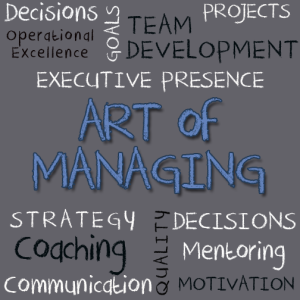 The Art of Managing series is dedicated to exploring the critical issues we face in guiding our firms and teams to success in today’s volatile world.
The Art of Managing series is dedicated to exploring the critical issues we face in guiding our firms and teams to success in today’s volatile world.
—
All of us are involved in negotiating for something on a fairly frequent basis, and over and over again, most of us make the same critical mistake. We reduce the negotiation to a battle of wills over positions (I want/You want) and we try and brute force our way to a conclusion. For many situations, there’s a better way.
While most negotiations start with some form of I want/Would you consider lead-off, (a position proposal), suppress your natural counter-position response and ask questions to better understand what the other party is truly trying to accomplish.
Consider Two Examples:
An educator is approached about switching classrooms and responds with, “No, I like my room” to the administrator making the request.
Two things have occurred as a result of this unfortunate opening dialog. The administrator now must navigate a miffed educator and the educator has most definitely not cultivated any political or negotiating capital with the overt rejection. The administrator’s true need is to bring two classes and teachers closer together to more easily enable team teaching and technology sharing.The educator should have probed for the reason behind the request, and armed with an understanding of the greater needs, might well have leveraged the situation to pursue interests of his own, included added technology, some flexibility on the curriculum or a leadership role on an important committee.
What could have been a productive, interest-focused discussion turned into a tug of wills over the room. It is likely that the next step will be a command to change rooms, leaving both parties worse off than if they had opted for a different negotiating path. In this very real scenario, there were missed opportunities on both sides!
In another example, an aggressive and competent professional consistently nagged his boss about a promotion incorporating a bigger title and more responsibility and compensation. His focus in the discussion was all on position(s), and what should have been a productive and on-going career development dialog turned into one that the boss quickly grew frustrated with when the issue was raised. The employee considered looking for another job and the boss ran the other way every time he sensed this conversation was surfacing yet again. Both responses were highly unproductive to the best interests of the parties and the firm.
The employee failed to build value for how he could better support the company at a new level with broader responsibilities, and the boss failed to focus on the real opportunity to develop and help the firm with this individual. Once interests were surfaced, the discussion resumed, a way forward was designed that satisfied both parties and the day was saved for the firm, manager and employee.
—
I can extend this discussion to pricing negotiations between suppliers and distributors or sales representatives and clients; debates over process changes between functions in organizations, and arguments over feature inclusions or scope changes on project teams. The position-focused debate is prevalent in almost every area of our professional and personal lives and the parties haggling over the specifics are leaving incredible value on the table with this approach.
The Bottom-Line for Now:
For some reason, many people are uncomfortable exposing their real needs in the opening stages of a negotiation. Arm yourself with the knowledge that something important is lurking behind the individual’s opening request. Strive to understand the real needs behind their position and you’ll be better armed to both address these needs and gain support for your own interests. Use the same technique when you are the initiator. Frame your interest to offer valuable context and to defuse early tension and then pursue a way forward that focuses on achieving respective interests without making the situation a giant tug-of-wills.
—
Don’t miss the next Leadership Caffeine-Newsletter! (All new subscriber-only content!) Register here
For more ideas on professional development-one sound bite at a time, check out: Leadership Caffeine-Ideas to Energize Your Professional Development.
New to leading or responsible for first time leaders on your team? Subscribe to Art’s New Leader’s e-News.
An ideal book for anyone starting out in leadership: Practical Lessons in Leadership by Art Petty and Rich Petro.
